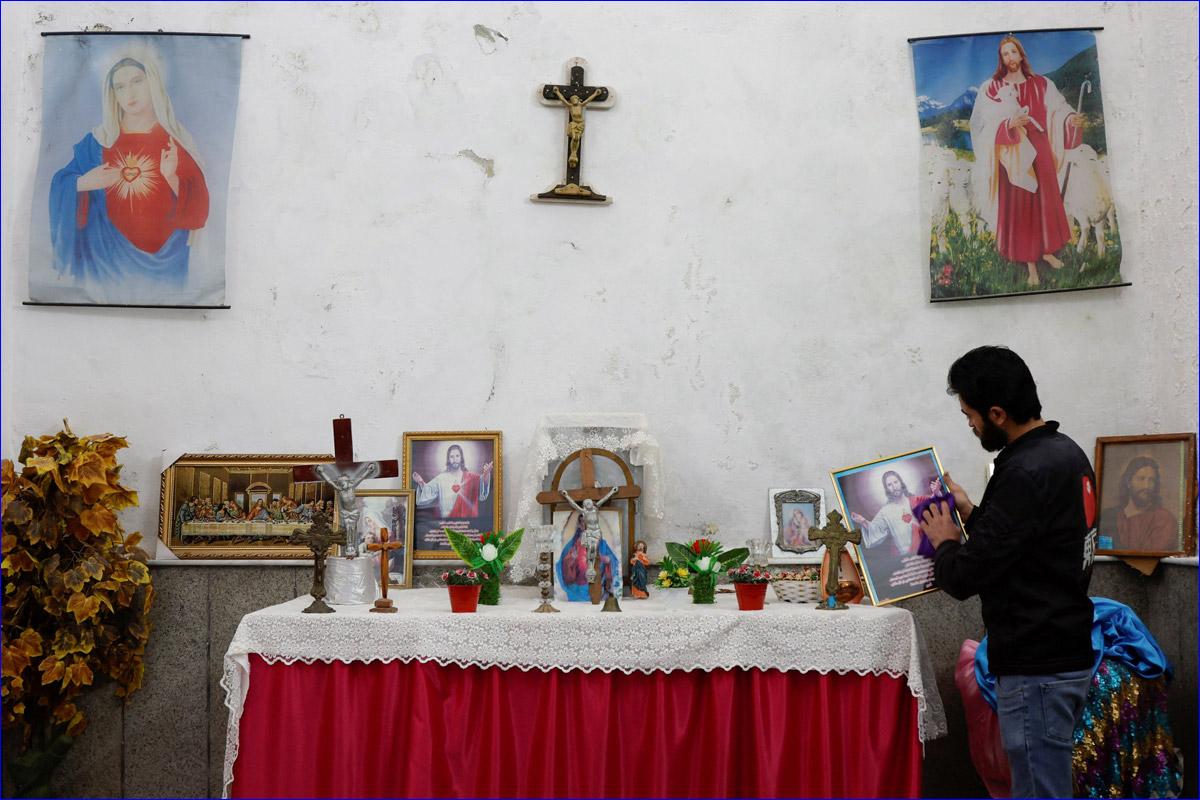


 OSV News photo/Khalid al-Mousily, Reuters)
OSV News photo/Khalid al-Mousily, Reuters)
IS militants first rampaged through the Yezidi heartland of Sinjar Aug. 3, 2014, murdering men, abducting and enslaving women and children, while destroying homes and businesses affecting thousands of Yezidis. More than 3,000 Yezidi men, women and children were killed, and at least 6,800 more -- primarily women and children -- were abducted by IS.
Related: Timeline of ISIS in Iraq
Related: Attacks on Assyrians in Syria By ISIS and Other Muslim Groups
Then, on the night of Aug. 6, 2014, IS went after Iraqi Christians, forcing 120,000 to flee their homes.
It was a "collective tragedy" for the Iraqi people, Cardinal Louis Raphaël Sako, the Chaldean patriarch of Baghdad, told Vatican News.
"A tragedy involving Christians and other minorities that remains etched in people's minds. It is true that ISIS has been defeated, but its ideology remains strong, and not only in Iraq."
Following the territorial defeat of IS in March 2019, an estimated 2,600 Yezidis remain missing 10 years after the IS attack on the Yezidi heartland, according to the Office for Kidnapped Yezidis in Dohuk, as cited by Amnesty International.
"The ISIS genocide against Yezidis and Christians didn't happen just one night. And it hasn't ended just because the territories controlled by ISIS are now regained," Father Emanuel Youkhana, a priest, or archimandrite, of the Assyrian Church of the East, told OSV News by phone. "Therefore, we are speaking about an ongoing crisis and ongoing genocide."
Iraqi troops failed to protect Yezidis and Christians during the 2014 Islamic State invasion and aftermath. The Iraqi government has since also largely left Sinjar without reconstruction, observers say.
Father Youkhana's Christian Aid Program Northern Iraq (CAPNI), a Christian program for displaced Iraqis around the city of Dohuk and the Ninevah Plains, has been at the forefront of providing badly needed aid to displaced Yezidis.
"In the first months, CAPNI provided food, hygiene and clothing to Yezidis who lost everything," Father Youkhana said. "Afterwards, when displacement became more formal in the camps or informal settlements in the villages, we organized 110 buses to take Yezidi children to and from school."
"We also provided child-friendly spaces to help deal with their trauma from such devastation," Father Youkhana said. "And we continued such support until the areas taken by ISIS were regained. I never use the word 'liberated' because that means more than what we currently have."
CAPNI's next phase included helping 1,500 Yezidi and Christian families return to their native Ninevah Plains by rehabilitating their homes, shops, 32 schools, infrastructure and public services. "This is still ongoing," Father Youkhana said.
"We continue to provide job opportunities, vocational training and loans to female-headed households which are unable to compete in the public job market, but can produce home goods," the Catholic priest said.
"Unfortunately, the Yezidis displaced by ISIS in Sinjar are still in camps 10 years after the ISIS invasion. So, they are still in the phase of displacement/return," Father Youkhana explained.
"There are concerns of a lack of security, damaged or destroyed homes, minimal job opportunities, and a lack of health care, education, and even access to clean water," former U.S. Congressman Frank Wolf of Virginia said of the dire situation in Sinjar during remarks at Washington's Wilson Center July 30.
"People do not have much faith in the future," Cardinal Sako said in an interview for Vatican News. "Everyone keeps asking themselves: When will we finally have a modern, democratic, and civil state where everyone can be citizens with equal rights and duties?"

or register to post a comment.